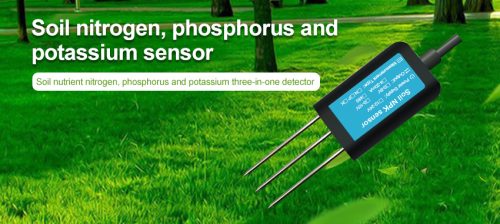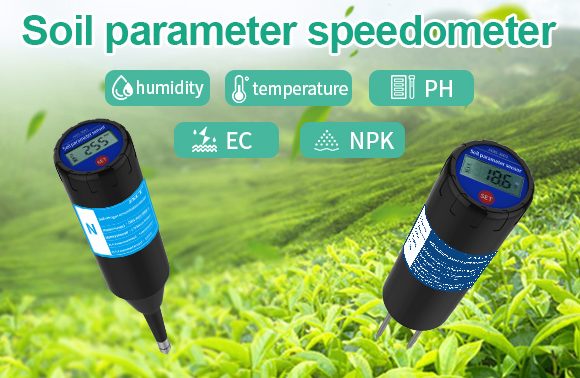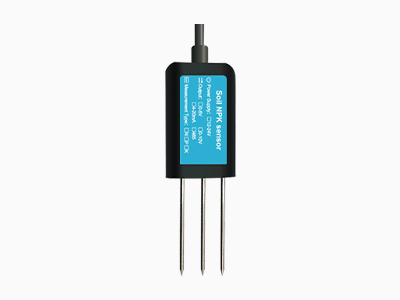Introduction NPK sensors
NPK sensor play a pivotal role in modern agriculture by enabling precise and efficient monitoring of essential nutrients—nitrogen (N), phosphorus (P), and potassium (K)—in soil tissues. This article aims to delve into the working principle, applications, and benefits of NPK sensors, highlighting their significance in optimizing nutrient management, enhancing crop productivity, and supporting sustainable agricultural practices.

Working Principle of NPK Sensors
Soil NPK sensors utilize various technologies to measure the concentrations of nitrogen, phosphorus, and potassium in soil or plant samples. The working principle of NPK sensors can be categorized based on the detection methods employed:
Optical Sensors:
Optical NPK sensor utilize light absorption and reflectance properties to estimate nutrient concentrations. These sensors emit light at specific wavelengths and analyze the reflected or transmitted light to determine the levels of N, P, and K in the sample. Optical sensors are non-destructive and provide rapid, on-site measurements, making them suitable for in-field applications.
Electrochemical Sensors:

Electrochemical NPK sensors rely on the electrochemical reactions between the target nutrients and electrodes to generate measurable signals. By monitoring the changes in electrical properties caused by the presence of N, P, and K, electrochemical sensors offer a reliable method for quantifying nutrient levels in soil or plant extracts.
Spectroscopic Sensors:
Spectroscopic NPK sensor utilize the principles of spectroscopy to analyze the interaction of matter with electromagnetic radiation. These sensors measure the absorption, emission, or scattering of light to identify the unique spectral signatures associated with nitrogen, phosphorus, and potassium, enabling accurate quantification of nutrient concentrations.
Applications of NPK Sensors
NPK sensor find diverse applications across different stages of agricultural production and soil management, contributing to improved nutrient utilization and crop yield optimization. The applications of NPK sensors include:
Precision Agriculture:
NPK sensors are integral to precision agriculture practices, enabling farmers to make informed decisions regarding fertilizer application, irrigation, and crop management. By providing real-time nutrient data at a spatially resolved scale, NPK sensors support precision nutrient management strategies, leading to targeted and efficient use of fertilizers.

Soil Health Assessment:
NPK sensors are used to assess the nutrient status of soils, facilitating site-specific soil fertility mapping and nutrient deficiency diagnosis. By identifying areas with nutrient imbalances, NPK sensors aid in tailoring fertilizer prescriptions and soil amendment strategies to address specific soil nutrient requirements.
Crop Monitoring and Diagnosis:
NPK sensors are employed for monitoring the nutrient status of crops throughout the growing season. By analyzing plant tissue samples or using non-destructive sensing techniques, NPK sensors help in diagnosing nutrient deficiencies or excesses, guiding timely corrective measures to optimize crop nutrition and health.
Research and Development:
NPK sensors are utilized in agricultural research and development to study nutrient dynamics, evaluate fertilizer formulations, and assess the efficacy of nutrient management practices. These sensors contribute to the advancement of precision agriculture technologies and the development of data-driven approaches for sustainable crop production.
Benefits of NPK Sensors

The adoption of NPK sensor in agriculture offers a multitude of benefits, ranging from improved resource efficiency to enhanced environmental sustainability. The benefits of NPK sensors include:
Enhanced Nutrient Management:
NPK sensors enable precise and site-specific management of nitrogen, phosphorus, and potassium, leading to optimized fertilizer applications and reduced nutrient losses. By tailoring nutrient inputs to match crop requirements, NPK sensors support efficient nutrient use and minimize the risk of over-fertilization.
Increased Crop Productivity: The use of NPK sensors facilitates targeted nutrient delivery, ensuring that crops receive adequate and balanced nutrition. This targeted approach to nutrient management can result in improved crop yields, better crop quality and enhanced overall productivity of agricultural systems.
